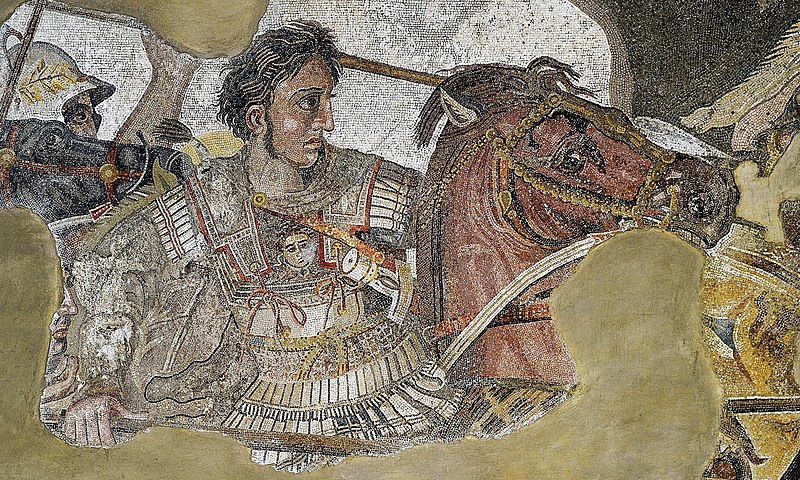Alexander the Great is a name that reverberates throughout history as one of the most illustrious conquerors of all time. Born in 356 BCE in Pella, Macedonia, Alexander’s legacy of military genius, strategic brilliance, and ambitious expansion shaped the ancient world. This article delves into his life, achievements, and lasting impact on history.
Early Life and Education
Birth and Background
Alexander was born on July 20, 356 BCE, to King Philip II of Macedonia and Queen Olympias. From a young age, he displayed remarkable intelligence, courage, and ambition. His mother instilled in him the belief that he was destined for greatness, often recounting tales of his divine lineage.
Education by Aristotle
At the age of 13, Alexander was tutored by the renowned philosopher Aristotle. Under Aristotle’s guidance, he received an education that encompassed a wide range of subjects, including philosophy, science, politics, and literature. This education played a crucial role in shaping Alexander’s strategic thinking and leadership skills.
Rise to Power
Ascending the Throne
In 336 BCE, King Philip II was assassinated, and 20-year-old Alexander ascended to the throne of Macedonia. Despite his youth, he swiftly consolidated his power and secured the loyalty of the Macedonian army and nobility.
Consolidating the Greek States
To achieve his ambitions, Alexander first needed to unify the Greek city-states, many of which were in rebellion. He employed both diplomacy and military might to bring them under his control, establishing the Corinthian League, a coalition of Greek states, with him as the leader.
Conquests and Military Campaigns
The Persian Campaign
With Greece firmly under his control, Alexander set his sights on the Persian Empire, the most powerful empire of the time. In 334 BCE, he crossed the Hellespont into Asia Minor, marking the beginning of his legendary conquest. His first major victory came at the Battle of the Granicus, where he defeated a Persian satrapal army.
The Battle of Issus
In 333 BCE, Alexander faced the Persian King Darius III at the Battle of Issus. Despite being vastly outnumbered, Alexander’s strategic brilliance and the unwavering loyalty of his troops secured a decisive victory. Darius fled the battlefield, leaving his family and treasures behind.
The Siege of Tyre and Conquest of Egypt
Alexander’s next major challenge was the city of Tyre, a heavily fortified island stronghold. After a seven-month siege, he captured the city, demonstrating his determination and resourcefulness. Continuing his march, he entered Egypt in 332 BCE, where he was welcomed as a liberator and crowned as Pharaoh in Memphis.
The Battle of Gaugamela
In 331 BCE, Alexander faced Darius III again at the Battle of Gaugamela, one of the largest and most significant battles in history. Employing superior tactics and the unyielding loyalty of his soldiers, Alexander achieved a monumental victory. Darius fled once more, marking the collapse of the Persian Empire and Alexander’s control over its vast territories.
Governance and Administration
Founding Cities
Alexander was not only a brilliant military leader but also a visionary statesman. He founded numerous cities, many of which were named Alexandria, to serve as administrative centers and promote cultural exchange. The most famous of these is Alexandria in Egypt, which became a major hub of learning and commerce.
Integration of Cultures
Alexander’s vision extended beyond mere conquest; he sought to integrate the diverse cultures of his empire. He encouraged intermarriage between his soldiers and local populations, adopted Persian customs, and promoted a policy of cultural fusion. His efforts to create a unified empire were embodied in his concept of the “Brotherhood of Man.”
Legacy and Impact
Death and Succession
Tragically, Alexander’s life was cut short at the age of 32. He fell ill and died in 323 BCE in the palace of Nebuchadnezzar II in Babylon. His untimely death left a power vacuum and led to the fragmentation of his empire among his generals, known as the Diadochi.
Hellenistic Influence
Alexander’s conquests ushered in the Hellenistic Era, a period marked by the spread of Greek culture, language, and ideas across the vast territories he had conquered. This cultural diffusion had a profound and lasting impact on the ancient world, influencing art, literature, science, and philosophy.
Military Legacy
Alexander’s military strategies and tactics are still studied in military academies around the world. His ability to inspire loyalty, his innovative use of combined arms, and his mastery of logistics and siege warfare set a benchmark for future military leaders.
Conclusion
Alexander the Great’s legacy endures as a testament to his unparalleled ambition, strategic brilliance, and visionary leadership. He transformed the ancient world through his conquests, leaving an indelible mark on history. Despite his short life, Alexander’s influence extended far beyond his time, shaping the course of civilizations and inspiring generations to come. As we look back on his life and achievements, we are reminded of the power of vision, determination, and the enduring impact of one man’s quest to conquer the world.



